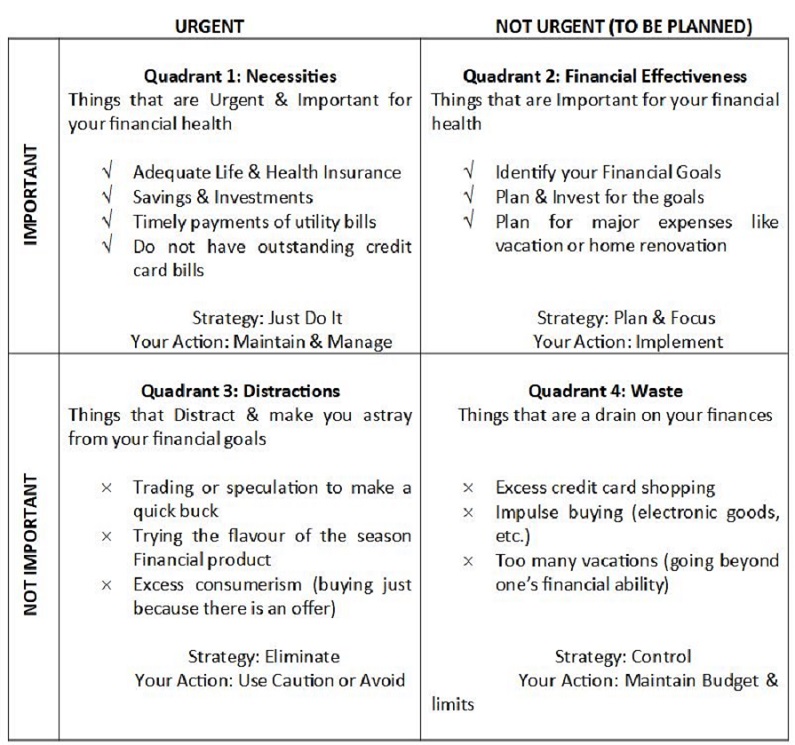Classify your priorities for a better financial life
Wealth creation requires focus, patience, determination and the will to avoid any spending that is not relevant and important
- KR Hariharan
- Last Updated : August 25, 2021, 15:43 IST

You and your family are planning an international vacation after 3 months. Which of the following are you most likely to do first?
1. Go shopping to buy clothes and accessories for the vacation
2. Visualize yourself enjoying the vacation
3. Search for best options on travel and stay
4. Find out how long will it take to get a Visa?
Logic dictates that option 4 and option 3 should be given priority, in that order. Because if we start with options 1 and 2 and ignore the rest, then we may end up going on vacation only in our dreams!
There are two lessons we can take from this example. First, in both life and finances, we need to prioritize the right things and take decisions accordingly. Only then can we achieve our goals and targets. Second, it is equally important to ‘stick’ to the decisions we make and not give up midway. All of us decide that we shall start exercising, walking, not eating junk food, start saving and investing in the future, but most people end up not doing them. The power of our will is the ability to make decisions and choices and act in accordance with them. In other words, we need to “walk our talk”.
Let us take a look at how we can do this to have a better life from a financial perspective.
Organize and execute priorities: We need to prioritize what is important for us in our life and not get carried away by what is happening in the world around us.
Classify financial priorities as per the grid: There are things that are urgent and there are things that are important. If we were to classify our financial priorities, we can create a matrix using these two parameters to get a 4 x 4 quadrant as given below.
Quadrant 1 is about necessities: What we need to implement at the earliest. There is no substitute for this. Most people ignore these basic fundamental principles of money management.
Quadrant 2 is about effectiveness: It is about planning and focus. These are important and have to be planned. These are your goals that will manifest in the form of major expenses in the future and hence needs preparation in advance.
Quadrant 3 is about distractions: All those things that look attractive but can be detrimental to the financial health. These are difficult to resist and are tempting. It also manifests in the form of the fear of missing out (FOMO). One needs to be cautious and introspect if they are actually the right candidate to try these out.
Quadrant 4 is about instant gratification: Something that gives us joy/pleasure for that moment but actually is a drain on your finances. These are things that are not important nor urgent, but many individuals perceive them to be urgent and important in this material world. Remember, wealth is not what you see, it is what is not seen. Our investments are not visible to others, but our spend on vacations, discretionary goods are visible to others. Quadrant 4 should be the last priority for an individual and something that can be done once you have ensured that the Quadrants 1 & 2 are in place.

Life is all about priorities. We need to focus our efforts on segregating our priorities into these four quadrants. Quadrant 2 is especially important. But it is not just about creating a picture of what we want, but also have the willpower to execute them. Arguably, Quadrant 3 and 4 look good, but can be destructive to our financial health.
Controlling discretionary expenses will go a long way in building our wealth. Remember that wealth creation requires focus, patience, determination and the will to avoid any spending that is not relevant and important. The more we focus on Quadrant 2, the easier will be our path towards wealth creation.
(The writer is Segment Head-Learning & Development, Axis Mutual Fund. Views expressed are personal)
Download Money9 App for the latest updates on Personal Finance.
Related
- पहली छमाही में रियल एस्टेट में संस्थागत निवेश 37% घटकर तीन अरब डॉलर रहने का अनुमान
- Budget’24: New LTCG rule to hit long-term property owners hard
- Looking to buy gold? Buy now before it’s too late!
- Budget 2024: What is NPS ‘Vatsalya’ scheme? How to apply & other benefits?
- Budget’ 24: Startup ecosystem all smiles with scrapping of angel tax
- Budget’24: New NPS scheme for minors launched, here’s how you can benefit

